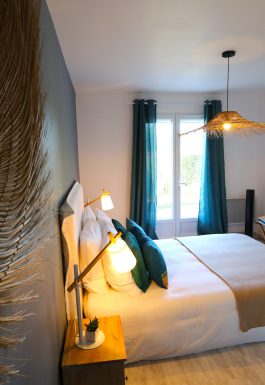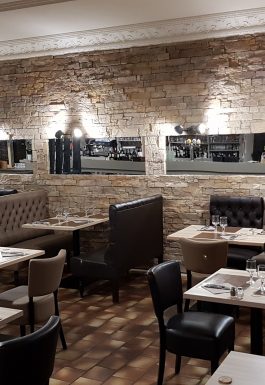What is a furnished tourist accommodation?
The furnished tourist accommodation is a furnished villa, apartment or studio, for the exclusive use of the tenant, offered for rent to a passing clientele who makes a stay characterized by a rental by the day, week or month. and who does not take up residence there. Furnished tourist accommodation must meet minimum conditions of habitability and comfort. They are free from specific permanent odors and are located outside the nuisance zones resulting from classified installations, main roads, railways, airports for example. The use of the designation “furnished tourist accommodation” is based on a voluntary administrative classification of the rentals concerned according to a procedure presented below. In other words, the rentals of furnished accommodation for tourist use which have not been the subject of this administrative classification cannot be referred to as furnished tourist accommodation.
The declaration of furnished accommodation: the minimum regulatory obligation
Since the 22 March 2012, the so-called Warsmann law (n ° 2012-387) requires all owners of furnished tourist accommodation to make a declaration to the town hall of the municipality where the rental accommodation is located. Main residences temporarily rented to holidaymakers are not subject to this obligation. Only second homes rented out must be the subject of such a declaration. This formality is not completely new since it was previously imposed on the owners of a furnished tourist accommodation who wanted to have it classified. From now on, any type of property, classified or not, must be declared to the town hall, even if the declaration does not apply to request for classification of the furnished apartment. The furnished tourist accommodation can therefore be declared at the town hall without being the subject of a classification. Failure to comply with this obligation results in a fine corresponding to a 3rd class offense (lump sum of € 45 to € 450). In addition, each furnished tourist accommodation must be declared. An owner of several dwellings of this type must therefore make a declaration for each of them. Article D324-1-1 of the Tourism Code provides that the declaration includes information on the identity and address of the declaring owner but also a description of the furnished tourist accommodation (number of rooms, number of beds, rental period, etc.). Any change in any of these elements must be reported by means of a new declaration. This formality is accomplished simply by completing the Cerfa form 14004 * 04 which, once registered, gives the right to a receipt attesting that the declaration has been made. The purpose of this legislative change is to better understand the tourist offer offered to holidaymakers and thus allow municipalities to have more complete information to better inform the public about the existing local offer. These declarations are not transmitted to the tax services since the municipalities do not manage income tax.
The individual police record
Le decree 2015-1002 of August 18, 2015 introduces the obligation to draw up individual police files on the arrival of foreign customers to all providers providing accommodation. They are no longer transmitted daily but must be kept for 6 months and returned at the request of the police or gendarmerie. "For the purposes of preventing disturbances of public order, judicial inquiries and research in the interest of individuals, hoteliers, operators of holiday villages and family homes, tourist residences and residential villages, rental companies furnished tourist accommodation and bed and breakfast, operators of campsites, caravans and other developed sites are required to have the foreigner complete and sign, upon arrival, an individual police form, the model of which is fixed. by joint order of the Minister of the Interior, the Minister responsible for immigration and the Minister responsible for tourism.
The decree of October 1, 2015 defines the model of the individual police record.
The classification, what advantages?
- Show the quality of their accommodation: the customer needs benchmarks
- Pay less tax: 71% reduction in the micro BIC regime instead of 50% for an unclassified furnished apartment
- Getting paid by holiday vouchers: possibility of being recognized by theNational Association of Holiday Checks
- Benefit from a better promotion: your offer will be visible on all the sites of the Tourist Offices, the Departmental Committee of Tourism and many partners
- Better renting: possibility of using the commercial platform set up by CDT Gironde (for service providers located in Gironde)
You will have all the information on the procedure to follow on the website of the Gironde Departmental Tourism Committee in their space dedicated to classification.
New for furnished rentals
Simplification of declarations
Thanks to agreements signed between the General Directorate of Enterprises (DGE) and the Directorate of Legal and Administrative Information (DILA), owners (individuals or professionals) can now declare their furnished tourist accommodation or their guest rooms online. .
Remote declaration will make it possible to greatly simplify the process : the form completed by the owner will automatically generate a Cerfa form which will be sent to the town hall concerned. Printing and submitting a paper file to the town hall will no longer be necessary.
This simplification will make it possible to make the approach better known to users and to offer town halls more efficient digital processing and faster service.
Be careful, the automatic transmission system is not infallible. Take care once the declaration has been sent to check with the town hall in question that the form has been sent because some town halls are not connected to the online declaration system (in this case, it will be appropriate to use the paper form despite All)
Mention “professional” or “individual”
AirBnB, Abritel or Booking… From January 1, these platforms offering rentals of furnished tourist accommodation will have to inform the consumer of the professional status or not of the rental company.
In both cases, this information must appear visibly and legibly on the advertisement.
Remember that a lessor is considered a professional furnished rental lessor (LMP) in the case where his tax household withdraws at least 23 euros per year from this activity and that the sums generated by this rental are greater than other categories of income (treatments and wages, industrial and commercial profits, etc.).
Find HERE the differences between a professional and non-professional furnished rental company
A question ? Contact Ludovic BAGILLET - l.bagillet@paysfoyen.fr
























